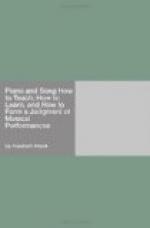DOMINIE (rather anxiously to Fatima). Will you do me the favor, Miss, to play something on the piano? Your aunt has told me a great deal about your playing.
FATIMA (smiling graciously). But, really, the piano is out of tune,—so my teacher says.
DOMINIE. But does not your teacher attend to having your piano always kept in tune?
FATIMA. Mamma says it is too expensive to have it tuned so often; it gets out of tune again so quickly. It is an old, small-legged piano, as you see: mamma is always saying, when I am older I shall have a Chickering. The tuner comes regularly once in three months; the time is not yet up.
DOMINIE. But is your teacher satisfied with the tuning of your piano?
FATIMA. Well, he has got used to it. It is the same with the other instruments he teaches on.
MRS. N. Now, pet, play us something. Mr. Dominie likes music; he is a judge of it; his daughters play too.
FATIMA. But what shall I play, mamma?
MRS. N. You have got heaps of notes there. Mr. Dominie, pray select something.
DOMINIE. But I don’t know which pieces Miss Fatima can master, and which she has now at her fingers’ ends.
AUNT. Pray, Mr. Dominie, choose any thing. They are all fine pieces. It makes no difference to her which she plays.
DOMINIE. But do you play that whole heap?
AUNT. She has played it all. She has played ever since she was ten years old, and she has a very good teacher. He taught here when my sister used to accompany her lover’s solos on the flute. Oh, those were charming musical evenings! And the teacher often played the guitar with them extempore. It was just like a concert.
DOMINIE. Indeed! that must have been very fine. Now, Miss, I beg—
FATIMA. But, mamma, just say what I shall play.
DOMINIE. Is not your teacher here this evening? He will know best.
AUNT (whispers to Dominie). He is busy this evening, composing some grand bravoura variations, which are to be dedicated to Fatima on her eighteenth birthday, the day after to-morrow. You must come to see us on that day. Fatima will play them at sight.
MRS. N. Fatima, don’t hold back any longer.
Play “The Huguenots” by
Thalberg: that’s a very fine piece.
DOMINIE. Pray do! I have not heard it since I heard Thalberg play it.
AUNT (to Dominie). Don’t you make your daughters play it then? Oh, that magnificent choral! That brings tears to my eyes! But the dear child always takes it too fast: her fingers run away with her.
MRS. N. Here it is. Please turn round so that you can see her hands, Mr. Dominie. You are such a famous teacher, perhaps you can make some suggestions. (I was expected only to admire.)
DOMINIE. I don’t like to disturb her freedom in playing; but I will turn round, if you say so.




